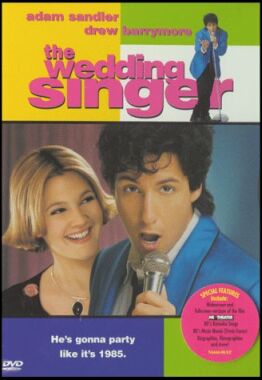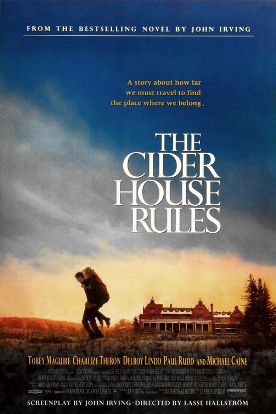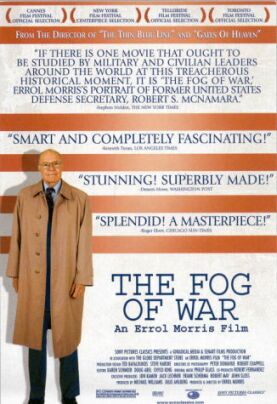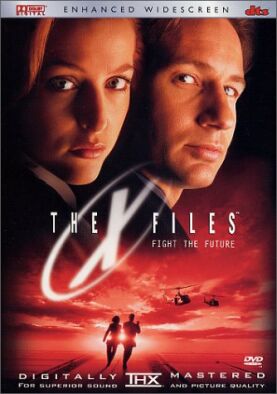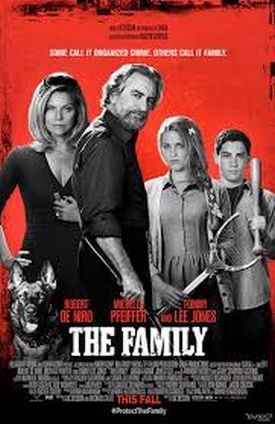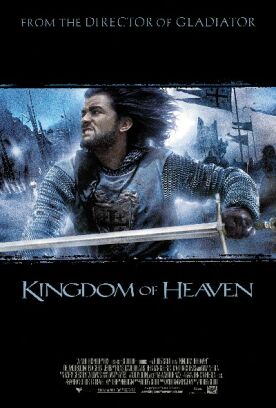Wedding Singer, The
There is a moment in The Wedding Singer, directed by Frank Coraci to a script by Tim Herlihy, that summed the picture up for me. After Robbie Hart (Adam Sandler) is stood up at his own wedding by the vixenish Linda (Angela Featherstone), he can’t bear to go near a wedding again, so he has to sing at other occasions, like Bar Mitzvahs. At one such he is, as always, a good MC and gets the kids dancing with each other. He is especially kind to a fat and unattractive boy by conspiring with his friend, a pretty waitress called Julia Sullivan (Drew Barrymore), to choose him as her dance partner and so demonstrate to the other kids that he is “cool” and not a “loser.” It is a harmless enough scene until they are dancing and the fat boy puts his hand on Miss Barrymore’s own, rather surprisingly ample bottom. It is obviously meant to be cute, and soon everybody is holding the bottom of his or her dance partner. But to me it strikes a false note, not the only one in the picture. A romantic story like this requires a sense of innocence in the background, a sense of love as surprise and discovery, and Coraci and Herlihy seem to want to stamp out innocence.
But all credit to the film for the things it does right. These include memorable cameos from Steve Buscemi as an embarrassingly drunken best man and John Lovitz as Robbie’s raunchy rival in the wedding-singing business who sings a song called “That ain’t no sock in my crotch, baby.” This is perhaps something else to do with lost innocence, like the kid with his hand on a woman’s bottom, and makes us think briefly that, unlike the recent crop of failed romantic comedies such as My Best Friend’s Wedding or Bed of Roses or One Fine Day, that the picture is going to dare to look this loss of innocence in the eye and make it to some extent the movie’s subject. Thus the setting in the mid-1980s, as Madonna and Rubik’s cube and break dancing and other signs of the times are dutifully brought forth, helps to show us that this is an unromantic time, a time when love commonly meant sex without marriage, while what marriage meant was becoming more and more uncertain.
At one point in the film, for example, an older woman rhapsodizes about true love among celebrities who are obviously made for each other — Donald and Ivana, Woody and Mia, Burt and Lonnie. On one level, this is a cheap joke, but it also raises a serious point about the death of romance as romance’s central symbol, the happily-ever-after wedding, becomes more and more a party and less and less a sacrament that anyone feels obliged to respect. Julia’s fiancé, Glen (Matthew Glave) is a junk bond trader and so (one supposes) is made to stand for all that is unromantic in the 80s. His reasons for marrying Julia are that “I owe it to her; I don’t want to break up. Plus, she was with me before I made my money, so I know I can trust her.” She, on the other hand, is not so happy in her choice of mate, for Glen routinely cheats on her and expects to go on cheating after they are married. His yuppie greed is a kind of token and complement of his general sliminess.
He, like Robbie’s faithless fiancée, stands for a kind of unrootedness, an easy contempt for the small town where they live. This is always a promising theme for Hollywood — just look at It’s a Wonderful Life — partly because it goes directly against the grain. Hollywood exists to bring big city entertainment to all those people in small town America who have settled for staying in the places where they grew up. They need to be persuaded of the importance of roots by the capital of rootlessness. Thus Glen tries to persuade Julia to run off to Las Vegas with him because it is “the wedding capital of the world” — at least for those to whom a wedding is just a party. But Julia and Robbie, who are inevitably drawn together, share an old-fashioned kind of love for their own place in the world. When Julia thinks (falsely, of course) that Robbie has got back together with Linda, she cancels her own wedding plans and impulsively agrees to go to Vegas with Glen.
This theme of romantic commitment versus mere selfish hedonism is a good one, but unfortunately the movie does not make enough of it. Instead, it brings on a pathetic deus ex machina in the form of Billy Idol, who plays himself. He meets Robbie on the plane to Vegas, whither the former has gone in pursuit of fleeing Julia, and holds out the hope of a recording contract. Hey! How come I didn’t get one of those when I got married? Likewise Glen’s villainy, like Robbie’s and Julia’s sweetness, is too much exaggerated, presumably on the Hollywood principle that we have to make the film’s morality real simple so that the kiddies, who make up most of the audience, can understand it. Yet I would not wish to be altogether ungrateful for a picture that comes closer than most of what comes out of Hollywood these days to being a competent romantic comedy — that genre that used to be a Hollywood speciality but which today’s industry seems almost incapable of making anymore.
Discover more from James Bowman
Subscribe to get the latest posts to your email.

